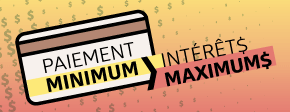Do you have questions about the payment of your credit card or line of credit? Here is what you need to know.
Every month, you have to reimburse the amount that appears on your credit card statement, or a part of that amount.
If you only reimburse part of the balance, you have to pay the "minimum payment" or "minimum instalment." The way to determine this amount is indicated in the contract, generally expressed as a percentage of the balance owing.
Amount of the minimum payment
The Consumer Protection Act provides for the minimum payment percentage you can be charged.
Contract entered into on or after August 1, 2019
If you entered into a credit card contract on or after August 1, 2019, the minimum payment to be made every month must correspond to at least 5% of the balance owing indicated on your account statement.
Contract entered into before August 1, 2019
If you already had a credit card before August 1, 2019, with a minimum payment percentage set at less than 4.5%, the minimum payment to be made every month from August 1, 2024 to July 31, 2025, must correspond to 4.5% of the balance owing indicated on your account statement.
What if the issuer of your credit card claims more than 4.5%?
- They may do so if the contract already provided for that possibility.
- They may not do so if they amended the contract in order to charge more than 4.5% without your consent.
As of August 1, 2025, credit card issuers will have to charge a minimum payment of at least 5% of the balance owing.
If the credit card issuer charges you a percentage that is higher than what is provided for in the contract or by the Act, contact the Office de la protection du consommateur.
Reimbursing the balance owing
It is always preferable to pay your balance in full every month. That way, you save on credit charges.
If you only make the minimum payment every month, you are reimbursing very little of your debt.
Refer to the page titled Minimum Payment: Maximum Intere$t to find out the amounts that apply to your situation or to try a simulation.
Chaque mois, vous devez rembourser le montant indiqué sur votre état de compte de marge de crédit ou une partie de ce montant. Vous devez effectuer ce remboursement sans utiliser votre marge de crédit.
Si vous remboursez une partie du montant, un minimum doit être payé. La façon de le déterminer est indiquée au contrat, généralement sous la forme d’un pourcentage du solde dû.
Il est toujours préférable de payer votre solde chaque mois. Vous économiserez ainsi des frais de crédit. Si vous ne faites que le versement minimal chaque mois, vous remboursez très peu votre dette.
If you have late payments, the financial institution may use the forfeiture of benefit of the term clause, if it appears in your contract. This clause allows the institution to require that you pay your balance before the due date.
Written notice
In order to use this clause, the issuer must send you a written notice titled "Notice of forfeiture of benefit of the term." This notice must be sent along with a statement of account.
30-day deadline
Once you have received the notice, you have 30 days to pay the late instalments and the accumulated credit charges. During this 30-day period, you may also petition the court to have the payment terms changed.
To rule on whether or not this change can be made, the court takes the following points into account:
- the total amount you have to reimburse according to the contract;
- the amounts you have already paid;
- the amount you have left to pay;
- your ability to pay;
- the reason you have not been making your payments.
If you are unable to make your late payments within 30 days after receiving the notice and have not filed a petition with the court, the financial institution is then allowed to demand immediate payment of your balance owing, which means the entire amount you have left to pay.
If you have an invoice payable to a merchant on a monthly basis, or on a fixed date, such as for a magazine subscription or a cell phone service, the merchant can offer you a preauthorized payment agreement. In doing so, you authorize the merchant to withdraw the payment you owe directly from your credit card.
Ending an agreement
If you want to end a preauthorized payment agreement, you must notify the merchant of that fact without delay. The merchant will then no longer be authorized to withdraw your payments.
Make sure the credit card issuer is also notified that you have ended the agreement. As soon as the issuer is notified, they must cease making payments to the merchant.
Last update : March 20, 2025
Was the information on this page useful to you?
The information contained on this page is presented in simple terms to make it easier to understand. It does not replace the texts of the laws and regulations.











Thank you! Your comment was submitted successfully.